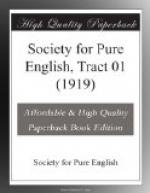The ideal of their proposed association is both conservative and democratic. It would aim at preserving all the richness of differentiation in our vocabulary, its nice grammatical usages, its traditional idioms, and the music of its inherited pronunciation: it would oppose whatever is slipshod and careless, and all blurring of hard-won distinctions, but it would no less oppose the tyranny of schoolmasters and grammarians, both in their pedantic conservatism, and in their ignorant enforcing of newfangled ‘rules’, based not on principle, but merely on what has come to be considered ‘correct’ usage. The ideal of the Society is that our language in its future development should be controlled by the forces and processes which have formed it in the past; that it should keep its English character, and that the new elements added to it should be in harmony with the old; for by this means our growing knowledge would be more widely spread, and the whole nation brought into closer touch with the national medium of expression.
The Society, therefore, will place itself in opposition to certain tendencies of modern taste; which taste it hopes gradually to modify and improve. Its object will be best exhibited by stating a few definite proposals which may be regarded as typical.
I. Literary taste at the present time, with regard to foreign words recently borrowed from abroad, is on wrong lines, the notions which govern it being scientifically incorrect, tending to impair the national character of our standard speech, and to adapt it to the habits of classical scholars. On account of these alien associations our borrowed terms are now spelt and pronounced, not as English, but as foreign words, instead of being assimilated, as they were in the past, and brought into conformity with the main structure of our speech. And as we more and more rarely assimilate our borrowings, so even words that were once naturalized are being now one by one made un-English, and driven out of the language back into their foreign forms; whence it comes that a paragraph of serious English prose may be sometimes seen as freely sprinkled with italicized French words as a passage of Cicero is often interlarded with Greek. The mere printing of such words in italics is an active force towards degeneration. The Society hopes to discredit this tendency, and it will endeavour to restore to English its old reactive energy; when a choice is possible we should wish to give an English pronunciation and spelling to useful foreign words, and we would attempt to restore to a good many words the old English forms which they once had, but which are now supplanted by the original foreign forms.
Other foreign denizens which are claiming naturalization we would encourage on the principle of preferring their more English forms. It would plainly be useful for writers to be acquainted with such matters; and a list of all such words with their English history would be a good example of the sort of academic service which this Society might render.




